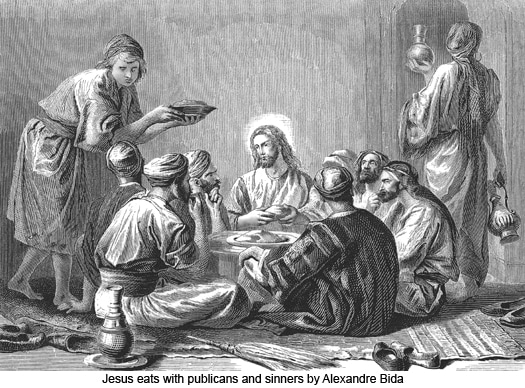Luke 15
Pastor James Preus
Trinity Lutheran Church
June 16, 2024
What does it mean that a shepherd leaves his ninety-nine sheep in the open country to look for the one lost sheep? It means that he values that sheep. What does it mean that a woman sweeps her whole house looking for a lost coin? It means that she values that coin. What does it mean that a father waits for his rebellious son, and when he sees him, runs to him, falls on his neck kissing him, and throws a party for his return? It means that that father values his lost son. Why does Jesus tell these three parables after the Pharisees and scribes grumble at Him for receiving sinners and eating with them? He is telling them that as the shepherd values his sheep, and as the woman values her coin, and as the man values his son, so also God values these sinners. Yet, where do we find the value in sinners?
Certainly not in their sin! Jesus is not proud of their sin. And He does not preach that these sinners should take pride in their sin. Rather, He preaches that they should repent. That is why these tax-collectors and sinners are coming to hear Jesus. They come to hear Him teach them to repent and receive forgiveness, and to mend their ways. Well, if God does not value a sinner because of his sin, why does God value the sinner? God finds the value of the sinner in Himself, in His own love for the sinner. And out of love for the sinner, God sent His Son to suffer and die to make atonement for the sins of sinners. This is the Gospel. The Gospel declares that God finds the value of a sinner in Christ’s atonement.
God does not find your value in your sin. God does not find your value in your brilliant opinions. God does not find your value in how much money or possessions you have acquired. God does not find your value in how well you have fulfilled His commandments. God finds your value in Christ Jesus, who suffered and died for your sins and grants you His own righteousness as a gift to be received through faith.
This Gospel message brings great comfort to those who recognize their sin and it causes anger and annoyance to those who think that they are righteous. The scribes and Pharisees grumble against Christ, because He shows that God values sinners. They hate this, because they think God should value them for their own righteousness, and therefore, He should not value these sinners. Yet, what Jesus teaches them is that they are not righteous. God does not value them for their self-righteousness. They too must repent of their sin and trust in Christ.
Yet, the fact that God finds the sinner’s value in Christ is of great comfort to sinners, because it means that the sinner does not need to lose hope! Your value before God is not lost because of your sin. Now, this does not mean that your sin does not harm you. The Prophet Isaiah warns in chapter 59, “Behold, the LORD’s hand is not shortened, that it cannot save, or His ear dull, that it cannot hear; but your iniquities have made a separation between you and your God, and your sins have hidden His face from you so that He does not hear.” (Isaiah 59:1-2) Your sins are worse than you think they are. They separate you from God; they earn you death and eternal condemnation in hell. Your sins forfeit your salvation. The Apostle warns, “Or do you not know that the unrighteous will not inherit the kingdom of God? Do not be deceived: neither the sexually immoral, nor idolaters, nor adulterers, nor men who practice homosexuality, nor thieves, nor the greedy, nor drunkards, nor revilers, nor swindlers will inherit the kingdom of God. And such were some of you. But you were washed, you were sanctified, you were justified in the name of the Lord Jesus Christ and by the Spirit of our God.” (1 Corinthians 6:9-11)
The Gospel tells the sinner that however bad your sins are, no matter how far you have been separated from God, however much you deserve eternal damnation for your sins, God still finds your value in Christ, who has made atonement for all your sins. And this comforts the sinner, because Christ’s righteousness always remains the same and endures forever. If your value is found in Christ, then your value never changes. It cannot be taken way. It cannot be diminished, for Jesus Christ is the same yesterday, today, and forever.
This is why Jesus praises repentance so highly. The Gospel declares that God finds the value of a sinner in Christ’s atonement. Repentance is when a sinner finds his own value in Christ’s atonement. In other words, repentance is when a sinner forsakes his own false righteousness and sin and trusts in Christ and His work of salvation instead. Repentance literally means to return or to change one’s mind. As sin separates us from God, so repentance brings us back again to Him. But without repentance, we remain alienated from God.
Repentance has two parts. First, when you recognize your unworthiness on account of your sins, and you feel true remorse over them, when you recognize that you have done evil and that you deserve to be punished by God. Second, faith, when you recognize that God values you for the sake of Christ Jesus, who made atonement for your sins on the cross. What does it mean that God sent His Son to live under the law in our place, to suffer the punishment for our sins, to die and rise again? It means that God values us despite our sin. It means that we can find our value nowhere else but in Christ.
Only those who recognize their sin and unworthiness before God rejoice that their value before God is found in Christ Jesus. That is why these tax-collectors and sinners gathered to hear Jesus, while the self-righteous grumbled. This is why the starving rebellious son returned home to his father, while the elder brother refused to come in. But for a sinner to find his true value in Christ, he must first recognize the evil of his sins. This is why the angels in heaven rejoice over one sinner who repents. Christ labored to save sinners from their sins. A repentant sinner is the fruit of Christ’s labor. Angels in heaven rejoice over the work of Christ.
Yet, we still sin. We don’t simply return like the prodigal son and then live happily ever after as dutiful children of God. We still go astray. We daily sin. And so, we must daily repent. We must daily find our sin harmful and our own righteousness worthless, and find our true value in Christ and His atonement for us. You are not saved because you once upon a time repented. You are saved because you are currently living in a state of repentance. And so, like the tax-collectors and sinners, we continue to gather to hear Jesus, to eat with Him, and to find our value in Him.
The Gospel declares that God finds the value of a sinner in Christ’s atonement. Repentance is when a sinner finds his value in Christ’s atonement. Reconciliation is when you find your brother’s value in Christ’s atonement. Why did the scribes and Pharisees grumble that Jesus receives sinners and eats with them? Because they hated the sinners. Why is the elder brother angry that his father throws a party for his brother? Because he hates his brother. Reconciliation is when you stop hating someone and love him instead. Reconciliation is when your enemy becomes your friend. How can this be done? It can only truly be done if you find the value of the one who has sinned against you, not in him, but in Christ. When you find your brother’s or sister’s value in Christ, then you rejoice like the angels when your brother or sister repents and returns to Christ.
John the Baptist told the Jews to bear fruits worthy of repentance. Fruits of repentance are things done to show that a sinner is truly sorry for his sins. A thief stops stealing, does honest work, and provides for the needy. A tax-collector stops cheating and pays back all whom he has defrauded. An adulterer stops committing adultery, a fornicator moves apart from his girlfriend until they are married, a drunk throws away the booze, an apostate comes back to church. And it is the job of the church to teach what fruits of repentance are, so that sinners do not continue in sin without repenting.
Yet, it is also good to note that God does not find your value in your fruits of repentance. He finds your value in Christ’s atonement for your sins. The fruits of your repentance simply give evidence of your repentance and faith in Christ. Fruits of repentance are never perfect in this life. The one who turns from sin often continues to struggle with the sin he turned from. The younger brother probably did not become the perfect brother when he came home. Yet, his older brother was not to find his brother’s value in the fruits of his repentance, and neither are you to find the value of the one who has sinned against you in their fruits, but always in Christ’s atonement.
Just as the fruits of your repentance are not perfect, so you must ask for forgiveness over again, so you may not be perfectly satisfied with your brother’s fruits of repentance. Perhaps, you want him to express his sorrow more or do more to make up for what he has done. Surely, the older brother would have been glad to see his brother become as one of his father’s hired hands. But we cannot find the value of our neighbor in their fruits of repentance, but only in Christ, just as you can only find your value in Christ. When you do that, you become more willing to meet with those who sin against you, to forgive them, and be patient with them.
The holy angels rejoice at the repentance of a sinner, because the repentance of sinners is God’s will and the angels rejoice at God’s will. Unrepentant sinners are outside of the angels’ protection, so angels rejoice when sinners repent, so that they may minister to them. We join in fellowship with the saints and angels in heaven when we repent, so angels rejoice at our fellowship with them. When we reconcile with one another, we imitate the good example of the angels by rejoicing in the repentance of others. When we come to church to hear Jesus, we not only come as sinners in need of forgiveness, who find their value and forgiveness from God in Christ Jesus, but we also rejoice with the angels and saints in heaven for our fellow sinners, who find their value in Christ. May we rejoice that Christ receives them as we rejoice that Christ receives us. Amen.



 RSS Feed
RSS Feed